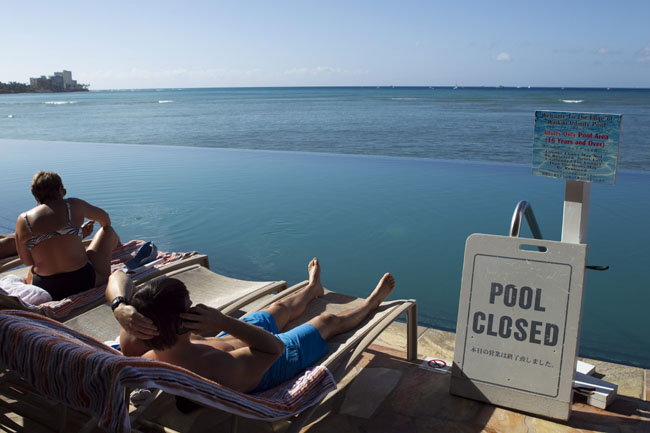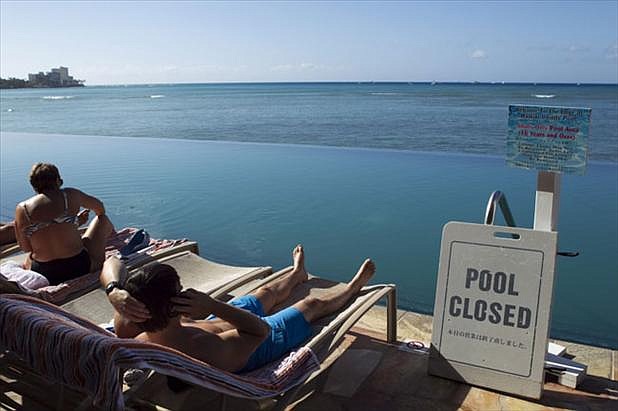 Sunbathers sit poolside in Waikiki in Honolulu. A tsunami spawned by the deadly earthquake in Japan caused tens of millions of dollars in damage to homes, businesses and boats in Hawaii after the waves crashed ashore on the state's pristine beaches last week. Now the islands are bracing for another hit - a loss in travelers from Japan. Gov. Neil Abercrombie predicted the economic consequences will be severe for this tourism-dependent state that is already dealing with a projected shortfall of nearly $1 billion over the next two years. (AP Photo/Marco Garcia)
Sunbathers sit poolside in Waikiki in Honolulu. A tsunami spawned by the deadly earthquake in Japan caused tens of millions of dollars in damage to homes, businesses and boats in Hawaii after the waves crashed ashore on the state's pristine beaches last week. Now the islands are bracing for another hit - a loss in travelers from Japan. Gov. Neil Abercrombie predicted the economic consequences will be severe for this tourism-dependent state that is already dealing with a projected shortfall of nearly $1 billion over the next two years. (AP Photo/Marco Garcia)By JAYMES SONG
Associated Press
HONOLULU - A tsunami spawned by the deadly earthquake in Japan caused tens of millions of dollars in damage to homes, businesses and boats in Hawaii after the waves roared ashore last week.
Now the islands are bracing for another hit - a loss in travelers from Japan.
Gov. Neil Abercrombie predicted the economic consequences will be severe for this tourism-dependent state that is already dealing with a projected shortfall of nearly $1 billion over the next two years.
"It's going to be terrible. It's going to be rough," he said earlier this week. "It's something that we have to come to grips with."
Hawaii is the top U.S. destination for the Japanese, hosting more than 1.2 million of the 16.6 million total outbound tourists last year. Visitors from Japan poured about $1.9 billion into Hawaii in 2010, or about 17 percent of the $11.4 billion overall visitor revenue.
The Japanese are treasured in the Aloha State for their affection of shopping and dining. They also embrace Hawaiian culture and outspend American visitors nearly 2-to-1 on a per-person, per-day average. Each day, there are 13 direct flights from Japan to Hawaii, bringing in anywhere from 3,000 to 5,000 tourists.
The tragedy is being followed closely here and has prompted residents, businesses and government leaders to respond with widespread fundraising efforts in this state, which has close ties with Japan. The first Japanese immigrants arrived here more than a century ago to work on the sugar canes fields with their children and grandchildren rising to prominence and power. Today, about a quarter of the state's population, or 296,674 residents, identified themselves as being part or full Japanese descent, according to the 2000 Census.
The fundraising efforts include concerts to donations accepted at most banks in a new statewide campaign called "Aloha for Japan." Telephone service providers are offering free phone calls to Japan, and the Hawaii-based U.S. Pacific Fleet is also helping in relief and rescue operations.
"This market is very important to us," said Mike McCartney, president and CEO of the Hawaii Tourism Authority. "(But) for us, first of all, we're most concerned about their well-being. More than dollars and cents, that's No. 1."
Hawaii has already experienced the cancellation of several groups from Japan, resulting in the loss of thousands of visitor arrivals.
H.I.S. Hawaii, a travel agency that handles about a fifth of all Japanese travel to Hawaii, saw new bookings plummet by half and cancellations tripling in the first three days after the March 11 earthquake, said Naomi Hashizume, the company's assistant general manager.
However, the cancellation rate dropped to less than 10 percent starting Wednesday and Hashizume is hopeful that the market will bounce back soon when power is fully restored in Japan and life returns to some degree of normalcy.
Kazuko Murota, a 58-year-old woman from Hokkaido, Japan, considered cancelling but went ahead with her Hawaiian trip only because she was traveling with a group of co-workers. Murota, who was shopping in Waikiki on Wednesday, said she didn't share with many people that she was leaving on vacation because she felt some guilt about leaving Japan and being so far from home during a tragedy.
"We can't help, because we're far," she said in Japanese. "It's a feeling that we're here having fun on vacation and there are people who have suffered."
Hawaii has experienced sharp declines in the number of Japanese travelers after past tragedies, from the deadly 1995 Kobe earthquake to the Sept. 11, 2001, terrorist attacks.
Unlike other cultures who try to get back to back to their feet and return to normal as soon as possible following a tragedy, travel industry officials say the Japanese tend not to travel or at least postpone in sympathy.
Newlyweds Tasuku and Mana Hashimoto of Tokyo were determined to make it to Hawaii for their honeymoon after being married a day after the earthquake.
"We just barely were able to (have the wedding)," Mana Hashimoto said. "We had it in Yokohama. There were some friends who weren't able to make it. But most did."
The couple considered cancelling their trip, but decided to go because there wasn't much damage in their area and the planes were flying. But they acknowledged it's been difficult to fully enjoy their vacation, knowing the devastation back home.
So far, airlines catering to Japanese tourists have not announced any reductions in flights or seats.
Mark Dunkerley, president and CEO of Hawaiian Airlines, said cancellations have been "pretty modest." Bookings are mostly handled by travel partners in Japan and they "continue to demand the level of service that we've already been providing and intending to provide in the coming months."
Hawaiian Airlines, which last year launched its first daily flight between Honolulu and Tokyo's Haneda International Airport, said it has no plans to change or delay its scheduled launch of daily nonstop service between Honolulu and Osaka in July.
Meanwhile, Hawaii is stressing that it is "open for business," with minimal damage to visitor industry infrastructure. Two Big Island hotels have been closed temporarily because of tsunami damage - the Four Seasons Resort Hualalai and Kona Village Resort.
McCartney said an analysis and plan to address the possible downturn will be completed in the next seven to 10 days.
"We're looking at the different scenarios, various markets and various alternatives, but our focus at this moment is offering them support," he said. "Our relationship goes much deeper than just a visitor destination-kind of a relationship. We're standing by them. That's the most important thing."
